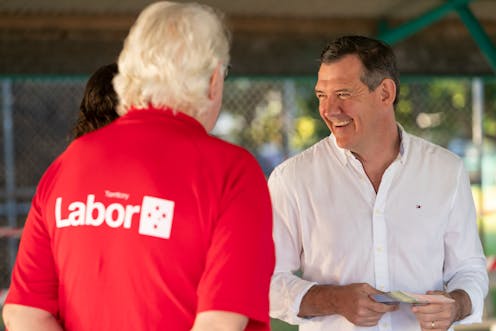Labor likely to win NT election; federal Labor trails by 59-41 in Queensland
- Written by Adrian Beaumont, Honorary Associate, School of Mathematics and Statistics, University of Melbourne

With 61% of enrolled voters counted in Saturday’s Northern Territory election, the ABC has Labor[1] winning 11 of the 25 seats, the Country Liberals (CLP) two, independents two and there are ten undecided seats. Labor needs two of the undecided seats for a majority.
Territory-wide vote shares[2] were 39.3% Labor (down 2.9% since the 2016 election), 31.4% CLP (down 0.4%), 13.0% Territory Alliance (up 10.0%) and 4.3% Greens (up 1.5%).
The Territory Alliance had hopes of supplanting the CLP, but have disappointed. The only seat they currently lead is Araluen[3] (by just 13 votes over the CLP), and their leader, Terry Mills, finished a distant third behind Labor and the CLP in his seat of Blain[4].
Several seats are in doubt because the electoral commission selected the wrong candidates for the two-candidate count, and has to realign this count. The Poll Bludger[5] lists Arnhem (Labor vs independent), Blain (Labor vs CLP) and Fong Lim (Labor vs CLP) in this category. In Blain and Fong Lim, the Territory Alliance were expected to make the final two.
Some postal votes are outstanding. Postal votes usually assist conservative candidates, so Labor’s position is likely to worsen on late counting.
State and territory parties usually do better when the opposite party is in power federally. With the Coalition in power federally, the CLP had a difficult task against a first-term Labor government. As there is very little polling in the NT, we do not know whether the coronavirus crisis had an impact.
Federal Newspoll aggregate has Coalition leading by 59-41 in Queensland
Newspoll recently published aggregate data[6] from federal surveys conducted from June 3 to August 8. Overall, the Coalition led by 51-49, but there were large state differences. In Queensland, the Coalition led by 59-41.
The Coalition also led by 54-46 in WA, but Labor led by 51-49 in NSW and 56-44 in Victoria. It was tied 50-50 in SA.
The Coalition led by 53-47 among voters without any tertiary education. Labor led by 52-48 among university-educated voters.
The federal Queensland Newspoll result is in line with the Queensland result at the 2019 federal election[7] (58.4-41.6 to Coalition). The popularity of the federal Coalition in Queensland probably explains why state Labor is narrowly trailing[8] (51-49 in the latest Queensland state Newspoll) despite the boost to Labor Premier Annastacia Palaszczuk’s ratings from the coronavirus crisis.
Mixed results at Tasmanian upper house elections
Elections to the Tasmanian upper house are normally held every May, with two or three of the 15 seats up for election on a rotating six-year cycle. Owing to coronavirus, this year’s elections for Huon and Rosevears were delayed until August 1. There was no two-candidate count until the August 11 distribution of preferences.
In Huon[9], Labor defeated the conservative incumbent independent by a 57.3% to 42.7% margin. In Rosevears[10], the left-wing independent incumbent retired, and the Liberals defeated an independent by a narrow 50.6% to 49.4%.
According to Tasmanian analyst Kevin Bonham[11], the upper house used to be dominated by conservative independents, but now endorsed party candidates have a majority in the upper house for the first time, with eight of the 15 seats (five Labor, three Liberals).
The results are a continuation of the north vs south divide in Tasmania. Rosevears is in the north, while Huon in the south. At the 2019 federal election, Labor lost the northern Tasmanian seats of Bass and Braddon[12] to the Liberals.
US election update
In the past two weeks, Joe Biden selected Kamala Harris as his vice presidential candidate and the Democratic national convention was held. The Republican convention will be held next week.
Biden currently leads Donald Trump by 51.1% to 42.4% in the FiveThirtyEight[13] aggregate of national polls. In the key states, Biden leads by 7.8% in Michigan, 6.9% in Wisconsin, 6.1% in Pennsylvania, 6.0% in Florida and 4.4% in Arizona.
In the past two weeks, the gap between the national vote and the “tipping-point state” in the Electoral College has increased from about 1.5% to 2.7%. That is, Trump is doing almost 3% better against Biden in Pennsylvania than nationally. If Trump reduces the national margin to less than five points, he could win the Electoral College again.
The discrepancy between the national vote and the Electoral College is one reason the FiveThirtyEight forecast model[14] gives Biden only a 73% chance of winning. Trump could also benefit from a strong economic recovery from coronavirus.
References
- ^ ABC has Labor (www.abc.net.au)
- ^ vote shares (www.abc.net.au)
- ^ Araluen (www.abc.net.au)
- ^ Blain (www.abc.net.au)
- ^ The Poll Bludger (www.pollbludger.net)
- ^ aggregate data (theaustraliannewscorpau.files.wordpress.com)
- ^ federal election (theconversation.com)
- ^ narrowly trailing (theconversation.com)
- ^ Huon (tec.tas.gov.au)
- ^ Rosevears (tec.tas.gov.au)
- ^ Kevin Bonham (kevinbonham.blogspot.com)
- ^ Bass and Braddon (results.aec.gov.au)
- ^ FiveThirtyEight (projects.fivethirtyeight.com)
- ^ FiveThirtyEight forecast model (projects.fivethirtyeight.com)













